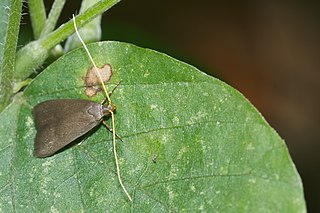Related Research Articles

The Lecithocerinae are a subfamily of small moths in the family Lecithoceridae. They are found worldwide, but most species occur in South Asia. The subfamily is characterized by the male genitalia with a bridge-like structure connecting the tegumen and the valva, and the uncus almost always is vestigal with two lobes at the dorsal base, only exceptionally united into a broad plate, but never as a thorn or spine.
Hamatina is a genus of moths in the family Lecithoceridae.
Hamatina diakonoffi is a moth in the family Lecithoceridae. It was described by Kyu-Tek Park in 2011. It is found in Papua New Guinea.
Hamatina iriana is a moth in the family Lecithoceridae. It was described by Kyu-Tek Park in 2011. It is found in Western New Guinea, Indonesia.
Hamatina jembatana is a moth in the family Lecithoceridae. It was described by Kyu-Tek Park in 2011. It is found in Western New Guinea, Indonesia.
Hamatina nabangae is a moth in the family Lecithoceridae. It was described by Kyu-Tek Park in 2011. It is found in Papua New Guinea.
Hamatina robdevosi is a moth in the family Lecithoceridae. It was described by Kyu-Tek Park in 2011. It is found in Western New Guinea, Indonesia.
References
| This article relating to the subfamily Lecithocerinae is a stub. You can help Wikipedia by expanding it. |